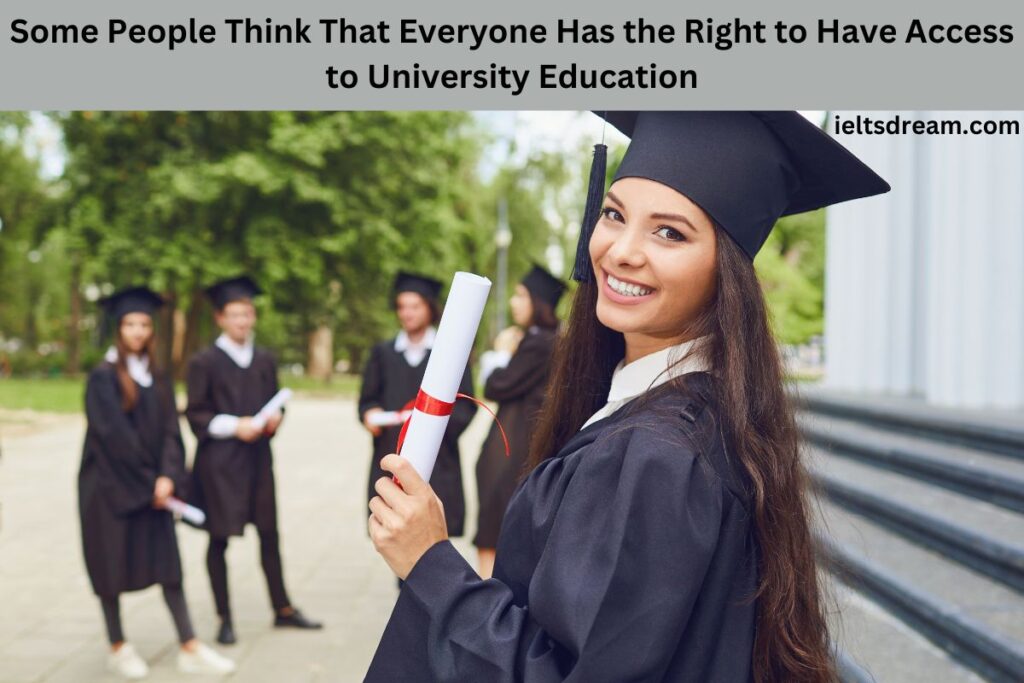Some People Think that everyone has the right to have access to a university education and that the Government should make it free for all students no matter what financial background they have. To extend do you agree or disagree with this opinion?
Sample 1: Some People Think That Everyone Has the Right to Have Access to University Education
In today’s rapidly evolving world, the significance of higher education cannot be overstated. It serves as a catalyst for personal growth, socio-economic mobility, and the development of an enlightened society. The question of whether university education should be accessible and free for all students, regardless of their financial background, is a topic that elicits diverse opinions. While some argue that such access is a fundamental right that should be supported by the government, others contend that it may not be feasible or fair to make it entirely free.
I am inclined to agree with the notion that everyone should have the right to access university education, irrespective of their financial circumstances. Education is an essential tool for empowering individuals and equipping them with the skills and knowledge necessary for success. Denying certain students the opportunity to pursue higher education based on their financial limitations perpetuates social inequalities and restricts overall societal progress.
By making university education free for all, the government can level the playing field and ensure equal opportunities for all individuals. It enables students from disadvantaged backgrounds to break the cycle of poverty and contribute meaningfully to society. Additionally, a well-educated populace fosters innovation, economic growth, and social cohesion, thereby benefiting the nation as a whole.
Sample 1:
However, it is crucial to acknowledge the practical challenges associated with implementing completely free university education. The cost implications are significant, and governments must find sustainable ways to fund higher education. This may involve redistributing resources, increasing taxes, or exploring public-private partnerships. Furthermore, ensuring that access to university education remains fair and based on merit is essential. Admission processes should continue to evaluate candidates based on their academic abilities and potential, rather than solely on their financial backgrounds.
In conclusion, I agree that everyone should have the right to access university education, regardless of their financial background. The government should take measures to make higher education more affordable and accessible, while also ensuring the fairness and sustainability of such policies. By investing in education, societies can unlock the potential of their citizens and foster inclusive growth and progress for the betterment of all.
Sample 2: Some People Think That Everyone Has the Right to Have Access to University Education
There is an ongoing debate regarding the accessibility and affordability of university education. While some argue that everyone should have the right to access higher education and that the government should provide it for free regardless of financial background, others hold a different perspective. Personally, I disagree with the notion that university education should be universally free, irrespective of financial circumstances.
While it is crucial to promote equal opportunities and ensure that education is accessible, completely free university education for all students may not be a practical or sustainable solution. Universities require significant financial resources to operate effectively, including faculty salaries, infrastructure maintenance, research funding, and educational resources. Making education free for all without considering the financial implications could strain the government’s budget and potentially compromise the quality of education provided.
Moreover, offering free university education to all students, regardless of their financial background, might lead to an imbalance in resource distribution. It could inadvertently benefit students who are already financially well-off, as they would not face any financial barriers to entry. This would be unfair to students from disadvantaged backgrounds who may have limited access to resources and struggle to compete on an equal footing.
Sample 2:
However, I do believe that there should be measures in place to make higher education more affordable and accessible. The government can explore options like reducing tuition fees, expanding loan programs with favourable repayment terms, and providing financial aid based on need. These initiatives would ensure that students from all financial backgrounds have the opportunity to pursue higher education without undue financial burden.
In conclusion, while I support the goal of promoting access to higher education, I disagree with the idea of making university education completely free for all students, regardless of financial background. Instead, a balanced approach that considers the sustainability of education systems and targeted financial support for those in need would be a more viable solution to address the issue of accessibility and affordability.

